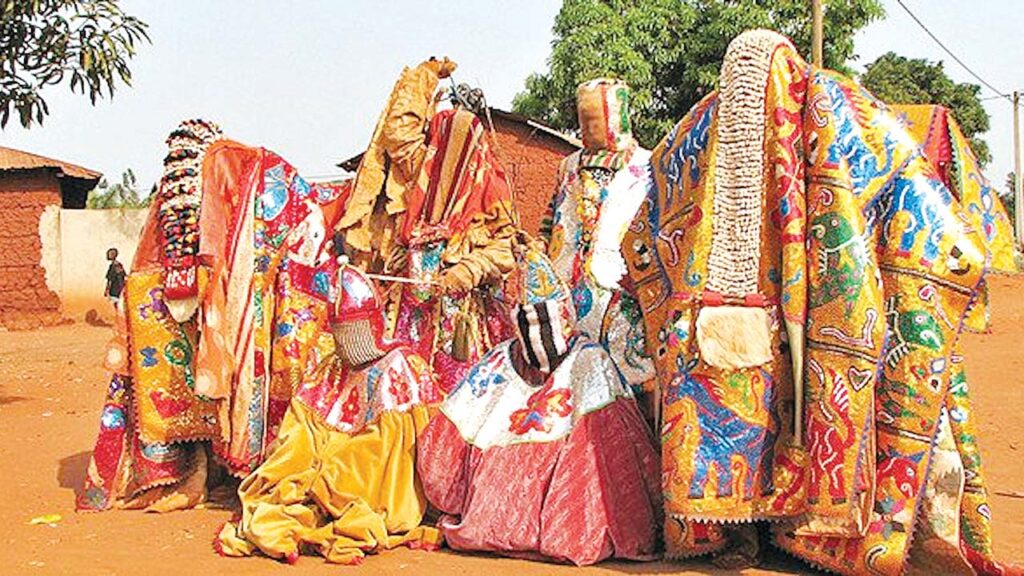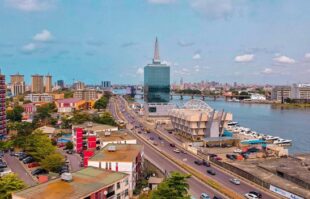Nigeria is a country that has numerous tribes and ethnic groups, and it is incredibly diverse and rich in culture. Over 500 indigenous languages are spoken by over 250 ethnic groups and 3 major tribes (Yoruba, Hausa, and Igbo) in Nigeria. When one considers that there are only 36 states in the nation, these numbers are even more astounding! Every tribe has a distinctive collection of rituals, practices, languages, dialects, places of worship, and festivals.
Cultural celebrations in Nigeria may honour particular deities or mark the beginning of a new season. Festivals play a crucial role in the maintenance of a people’s culture. Many of our cultural festivals have become international in order to bring together Nigerians who live abroad and to give non-Nigerians a chance to experience our culture.
The top 10 major cultural festivals we have in Nigeria are as below.
1. The Argungu Fishing Festival
The Argungu Fishing Festival is a yearly four-day celebration held in the town of Argungu in Kebbi State in northwest Nigeria. It started in 1934 as a symbol of the abolition of the long-standing animosity between the Sokoto Caliphate and the Kebbi Kingdom. In February or March, the festival takes place on the Sokoto River. To catch the biggest fish, thousands of fishermen compete using only nets. Other attractions include performances of dance and music, sporting events, and art and craft fairs. People travel from all around the world to witness or observe this festival.
The event is thought to have begun following the historic peace visit by Alhaji Hassan Dan Mu’azu, the 16th Sultan of Sokoto, at the time. The Argungu waters are thought to have become fertile and exceptional as a result of the Sultan’s prayers, which he is said to have offered after being welcomed with a large fish. This is thought to be why the Sultan’s visit is commemorated annually.
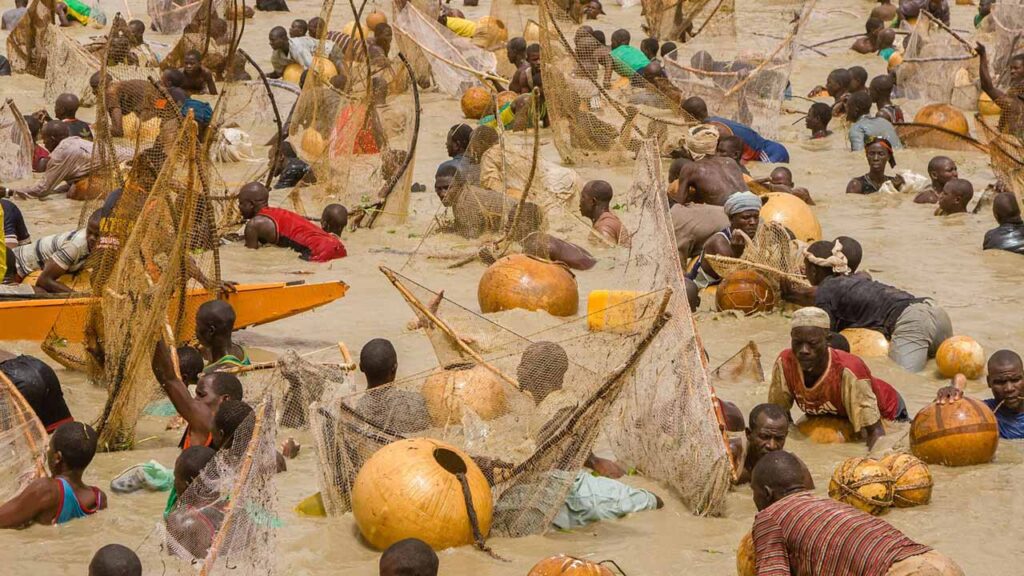
2. The Calabar Carnival
The Calabar Carnival commonly referred to as “Africa’s Biggest Street Party,” takes place every year in Cross River State, in the south-southern part of Nigeria. The carnival, which includes various activities like band competitions, parades, cuisine, and dancing, is held every December. Up to 50,000 costumed participants and 2 million spectators attend the carnival, which is televised across the nation.

3. The Durbar Festival
The Durbar festival, which takes place every year in the majority of Nigeria’s northern cities, is a celebration of culture, religion, and equestrian sports. It also commemorates the conclusion of Ramadan and the Muslim holidays of Eid al-Adha and Eid al-Fitri.
A colourful mounted parade led by the Emir and his entourage of horses, musicians, and artillerymen follows the early morning prayers. Noblemen travel to the Durbar festivities to honour the Emir and renew their allegiance to their respective emirates.
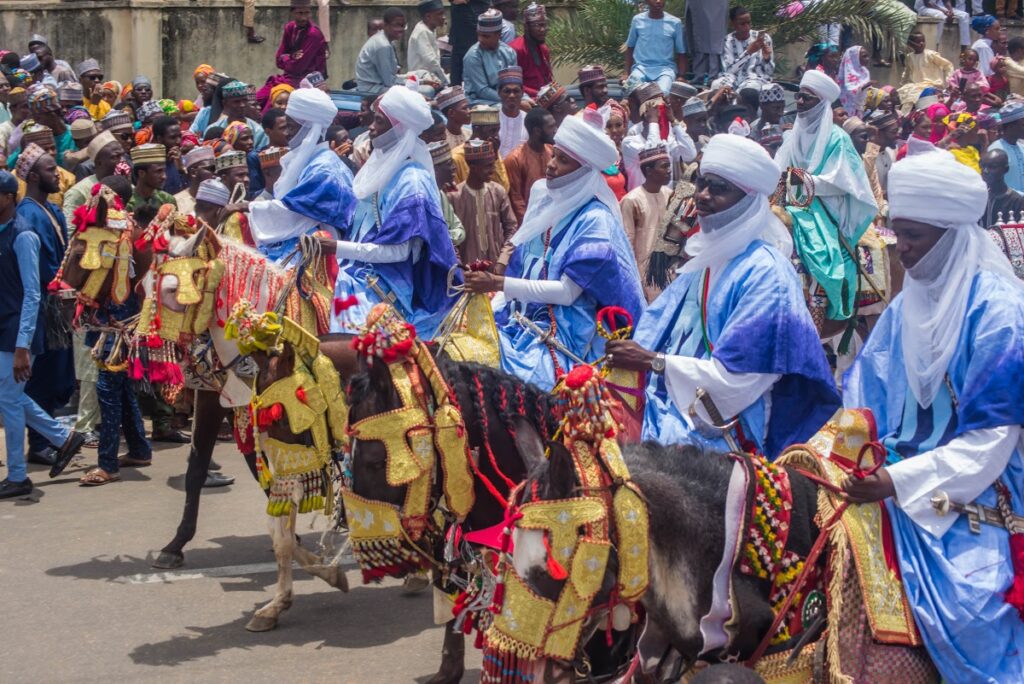
4. The Eyo Festival
The Eyo Festival is a Yoruba celebration that is exclusive to Lagosians; it is typically observed in Lagos by residents of Isale Eko. The celebration includes “Agogoro Eyo,” a traditional Eyo masquerade that portrays the spirits of the deceased and is dressed entirely in white, as well as other performances of regional dance forms.
Typically, it takes place on Lagos Island. Eyo also describes the festival-related masquerades that appear. Eyo is frequently cited as the inspiration for Brazil’s current carnival. Wearing hats is not permitted throughout the festival.
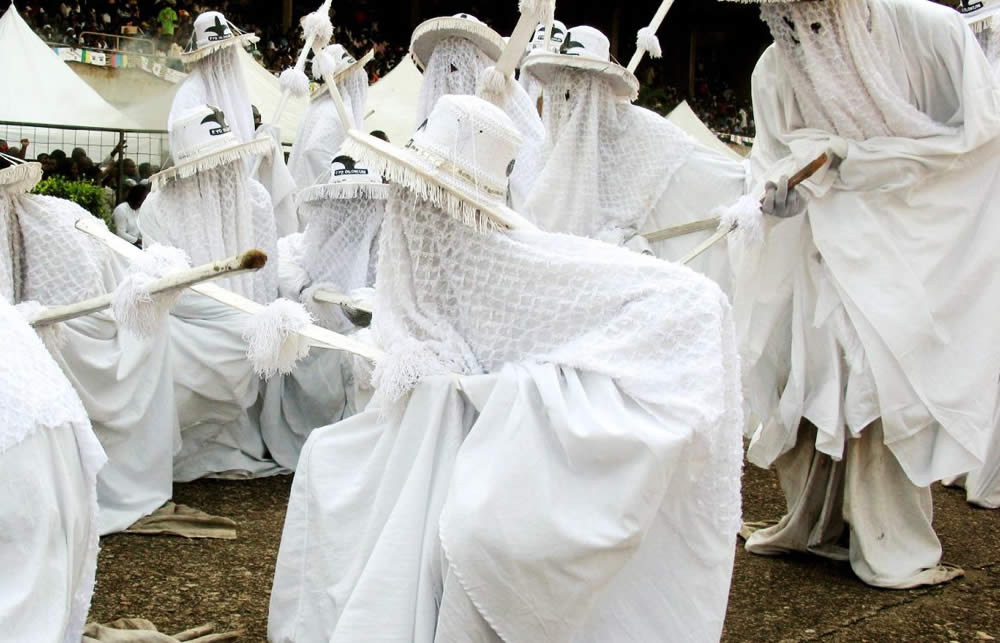
5. The New Yam Festival
Yam is an annual or perennial crop that is a staple food in West Africa and other parts of the world. It is well known to have a wide variety of species and goes by the generic scientific name of the Dioscorea Species family. Due to its widespread cultivation in nearly all of Nigeria’s states, yam has long been regarded as one of the most significant crops in the country. Anyone in a community who owns a yam barn is considered to be among the town’s wealthier members.
Yam is one of the main foods recognized as bride price when a man is looking for a woman’s hand in marriage since it is valued highly in Nigeria and considered to be more than just food. Due to the diverse mystical ideologies around Yam that have been passed down to them from ancestors’ stories up to this day, the Igbo people are the ones that celebrate the holiday the most. Since some of the most common yams are annual crops, even if they are occasionally viewed as permanent crops due to their life cycle, the New Yam Festival is observed annually to mark the end of one season and the start of another.
Eating the fresh yam before the celebration is also rumoured to be forbidden since doing so appeases the gods, the harvest spirit, and the deity of the Earth. By doing this, the god is glad and will deliver more good harvests in the upcoming season.
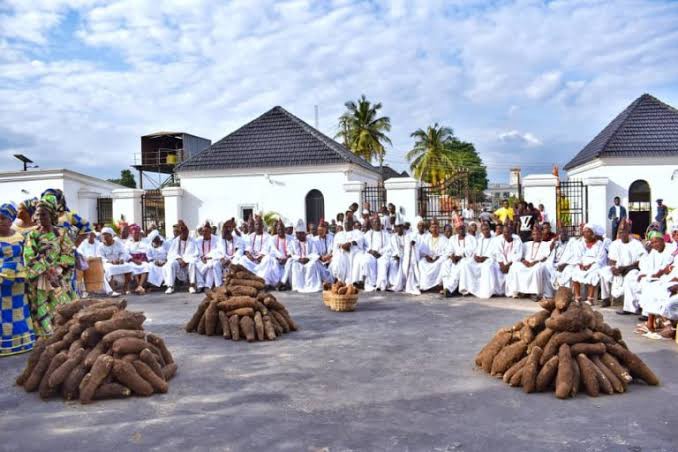
6. The Ofala Festival
The indigenous people of Onitsha in Anambra State, South-East Nigeria, hold an annual celebration known as the Ofala Festival, also known as Ofala Nnewi. The word ofala, which means “authority of the land,” is formed from the Igbo phrases ofo and ala (English: land). The celebration, which is referred to as the most significant remaining traditional ceremony of Onitsha natives, is held over two days, typically in December and January, in honour of the Obi (English: king).
One of the most well-known festivals in the Igbo nation dates back to the 16th century and is called the Ofala celebration, which means “Authority of the land.” During the event, the king (Obi) emerges three times to speak to the crowd and execute rituals under the direction of the chief priest. According to certain historians, the celebration is also related to the New Yam Festival in Onitsha and the king’s commitment to the security of his subjects.
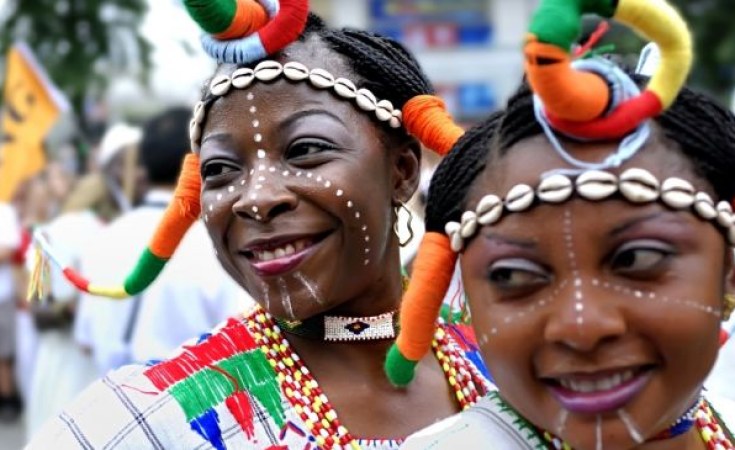
7. The Ojude Oba
In Ijebu Ode, a town in Ogun State in southwest Nigeria, the Muslim community observes the traditional Ojude Oba Festival. The yearly celebration, which honours the Royal Majesty, the Awujale of Ijebuland, is often observed on the third day following Eid al-Kabir (Ileya). One of the most revered and opulent events in Ijebuland and all of Ogun State is celebrated here.
On the third day of the Eid al Kabir holiday, which is known as “Ileya” in Yoruba, different cultural age groups known as “Regberegbe,” indigenous people, and their friends and colleagues from the near and far, parade in front of the king’s palace. The age groupings were reinstated in the 18th century by Oba Adetona.
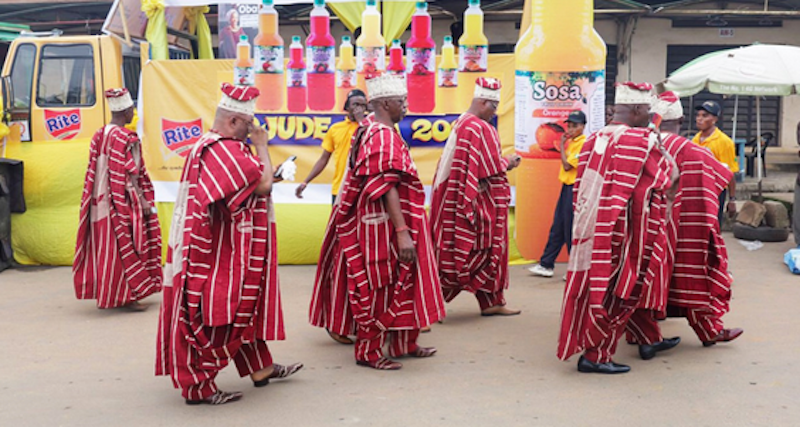
8. The Osun-Osogbo Festival
At the Oshogbo Sacred Forest, the Osun Festival is held toward the end of the rainy season, typically in August. Numerous thousands of people attend the week-long event, which is conducted in honour of the revered Yoruba deity and river goddess Osun. It comprises rituals in which priests offer gifts and sacrifices to the goddess in order to secure protection for their local communities. According to the priest, the event is a traditional cleansing of Oshogbo, which is recognized as one of UNESCO’s World Heritage Sites. Every year, a large crowd of spectators and people from all walks of life gather to participate in the cleansing, which is known locally as “Iwopopo.”
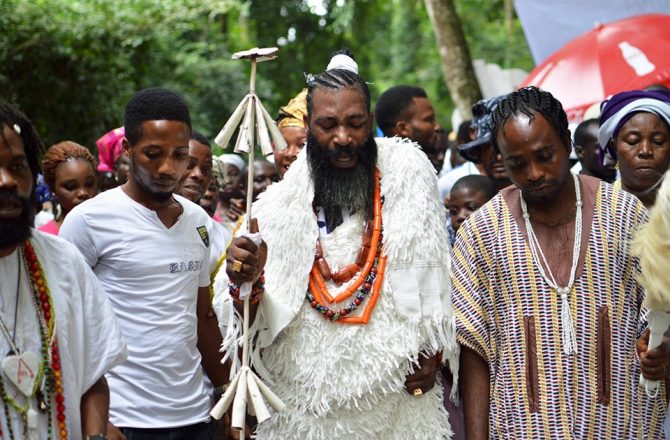
9. The Sango Festival
The Sango Festival often called the World Sango Festival, is typically held in August at the Alaafin of Oyo’s palace. The event is conducted in honour of Sango, the thunder and fire deity, and is observed in more than forty nations worldwide. The Sango festival may have begun as early as 1,000 years ago, after the exile of Sango, a well-known Yoruba rşà who is widely recognised as the founding father of current-day Oyo State.
The one-week festival, which now goes by the new name, attracts over 20,000 visitors from all over the world, including Brazil, Cuba, Trinidad & Tobago, and the Caribbean. It is typically held in August.
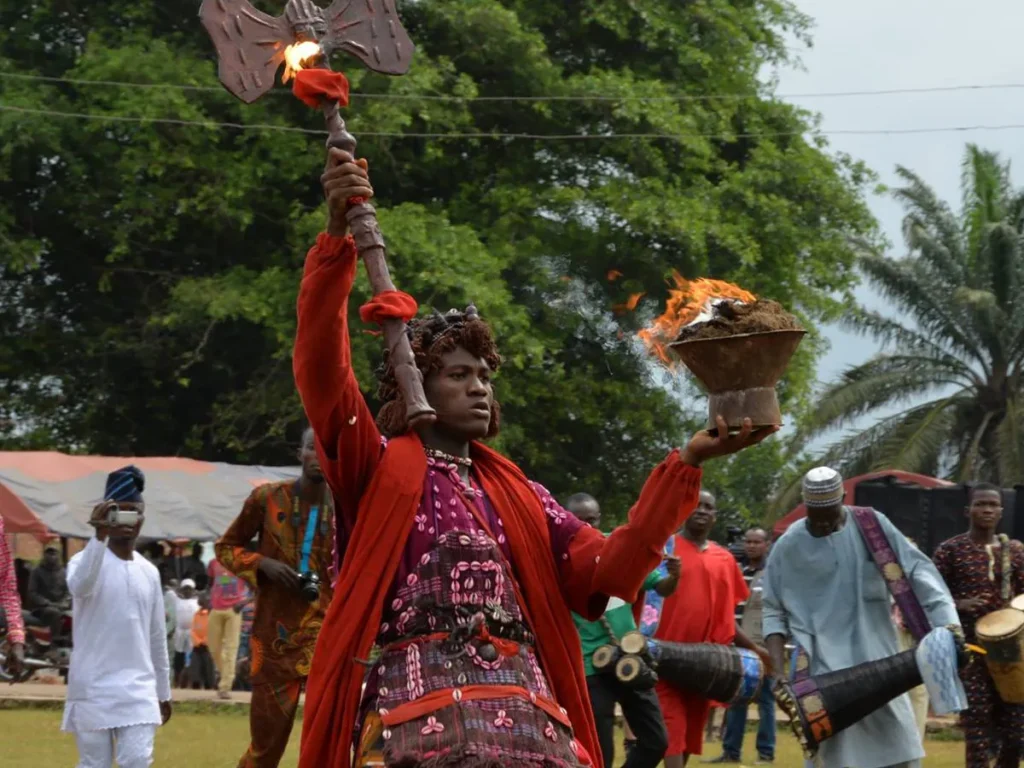
10. The Egungun Festival
In the Yoruba kingdom, the Egungun festival is held to commemorate the passing of notable figures. The event is observed by the Egbas, Egbados, and residents of Oyo, as well as other tribes in southwest Nigeria. It is a part of the Yoruba traditional religion.
The celebration is held between November and April, when there is no rain, and includes a variety of masquerade shows, singing, and dancing. The prevailing belief is that the ancestors’ spirits shouldn’t suffer in the rain.
